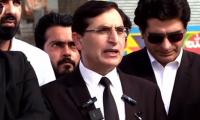The Cabinet decision to establish Media Tribunals was reportedly prompted due to couple of Ministers’ complaints to the effect that quite a number of journalists have been continuously targeting them to tarnish their public image and of the government by implication with mala fide intentions. The knee-jerk nature of the decision of the Cabinet obviously invited the retribution of media representative organisations all hues who have vociferously rejected the Cabinet decision to set up Media Tribunals describing it as another draconian initiative of the government to further strangulate the media that is already basing for breath due to the undeclared censorship. The media organisations like All Pakistan Newspapers Society (APNS) Council of Newspapers Editors, (CPNE), Pakistan Federal Union of Journalists (PFUJ), and Pakistan Broadcasting Association (PBA), The Pakistan Human Rights Commission and the Opposition political leadership have also detested the contention of the government that is seemingly on the collision course to silence all sort of dissent.
The All Pakistan Newspapers Society (APNS) has reportedly summoned the meeting early next month to discuss the alarming situation to oppose the government‘s anti-media move. The forum will also launch a sustained campaign to educate the people of the pitfalls of the government’s decision on the collective lives of the people notwithstanding its ramifications on the political economy. The other media organisations are also formulating their strategies to oppose the setting up of Media Tribunals, the self-defeating move to deny the people right of information and truth. The government’s bid to create an environment of impunity where it could have the free field to play without being questioned may not see the light of the day in totality. It is indeed flawed strategy that is bound to cause opposition in every walk of national life. The mindset is dangerous and its grotesque inclination would not augur well for the country, the federation, the democracy and the constitutional rule.
Is it for the first time that media has been criticising the government and its ministers’ poor performance? It is the primary duty of the lively media to shed lights on issues those have direct bearings on the life of the people with a view to improve the governance so far as the delivery of services is concerned. The official disproportionate outrage simply reflects poorly on the government’s tolerance level sadly signifying mismatch to the requisite threshold. It is the constitutional right under Article 19 of the Constitution guaranteeing freedom of speech and freedom of press within reasonable limits defined therein, and its violation invokes the defamation law with legal consequences. The immediate need for Media Tribunals may be therefore both unwarranted for being overly falling in the realm of overlapping. The undesirable contour of initiative embodied the apprehensions of further tightening the screws around media. The government though has backtracked but its misplaced exasperation with media may not be difficult to imagine.
It may be recalled the media had indeed been harsh to the PPP and its leadership as they were subjected to the worst kind of media trial as compared to other political leadership. But the leadership faced it with fortitude and perseverance and did not contemplate of tightening the noose around the critics or media during its watch. It was more so especially after the ferocious dictatorship of General Ziaul Haq when PPP came to power through vote. The PPP leadership, dominated by the commitment of democratic ethos, considered the vibrant media as the manifestation of robust functioning democracy—the very basis of the PPP ideology. For the PPP democracy and its continuity were non-negotiable because it had nurtured the same with the blood of its founding leaders and diehard workers. The movement for the Restoration of Democracy (MRD) against the grotesque dictatorship of General Ziaul Haq met with success with the leading role played by the PPP along with other democratic forces.
The journalists’ critical of the incumbent government may surely become the most sought after entities of the PTI leadership tomorrow when they will be in the Opposition seeking relentlessly their unconditional forgiveness of the ill-treatment meted out to them when they were in power. Media and journalists are surely going to stay in the country but the PTI government is surely subject to change because in democracy Opposition is government in the waiting. The PTI leadership may take leaf from the narrative of functioning of democracy and conduct its politics within the framework of best democratic practices. It may tread on the trajectory of vision rather than vendetta for its political survival afterwards else be prepared to wither on the wine. It should not be in the mind of the PTI leadership of playing the first and the last game. The prognoses though of its politicking sadly are paving the way for heading to the precipice.The PTI government is well advised not to open another front against media because vibrant media is absolutely indispensible for the functioning democracy. The attempts to gag media may surely not bode well because the government survives, thrives or collapses due to the public perception in which media plays the vital role. Annoying media means rocking the boat by default. So be aware of the ‘ides of marches’. There is no dearth of reports that media is facing intrusive censorship and the media organisations have been protesting against but in vain so far. The working environment for journalists is likely to become more problematic as the mandarins have reportedly figured out a scheme of more stringent and bald measures of curtailing the freedom of press.
The news of establishing Media Tribunals was like lightning bolt for the media industry that is already facing colossal professional, financial and retrenchment problems attributed to the government’s overt and covert endeavors. The international media organisations like Journalists without Boarders have been critical of the government intervention equating with detrimental to the freedom of media and the press. The limited quantum of flow of government advertisements seems the part of the strategy to push the media down the ground to kotow the official line. The allegedly discriminatory distribution of government advertisements has endangered the very survival of the non-compliant media houses. There are reports that the private sector major organisations are also influenced not to release advertisements to those media outlets that are determined to hold the flag high of the freedom of media no matter the cost.
Chairman Bilawal Bhutto while addressing the press conference vehemently rejected the government’s endeavour of stifling the media freedom. The chairman expressed his commitment in no uncertain terms that the Party would scuttle the government shenanigans against media while expressing unequivocal solidarity with journalist community. Its status as the fourth pillar of the state, an important condition for democratic dispensation, is non-negotiable. PPP cannot afford to see the other side when freedom of media is in danger because it is the fruit of the joint struggle of the journalists with the PPP leadership and other democratic forces. The chairman was unequivocal on the freedom of media and assured the people that freedom of media and speech will not be allowed to be snatched away from the people. Silence of dissent either on gun point or through the draconian ordinances will not be allowed was the crux of the message of the chairman. All the other Opposition political parties, with the exception of allies parties of the government, have rejected the decision with the unequivocal resolve to ensure the freedom of media under all circumstances. The Opposition parties unwavering stance against the government contention is very reassuring because the government cannot juggernaut it through the legislative process because Opposition has majority in the Senate. More importantly, the civil society has rejected it as the manifestation of the narrow mindset of the incumbent government leadership that is simply incapable of appreciating the free media as the sin qua none of democracy.
The decision of the Cabinet is the classic case of leap first and think later. The government did not consider worthwhile of taking all the stakeholders on board in the first place. The shallowness of the government smacks of the headless chicken running helter-skelter without a strategy. The Ministry of Information and Broadcasting could not anticipate the reaction of the media industry or its advice was not heeded to. The establishment of Media Tribunals may surely prove yet another faux pas for the government.
Tailpiece: Former president Asif Ali Zardari is in jail without even desert-cooler. It is equivalence with the drive of vilification of the people’s representatives that started with General Ayub Khan and is still continuing. Such ignominious treatment will certainly not succeed in breaking the will of the ‘Murd-i- Hur ‘but his tormentors will be exposed to the core. They are wittingly oblivious of the Maxim, ‘one is innocent until proven guilty”. Show me the Opposition leader I will show you the law. Stoicism of Judicial oversight may also be mind-numbing.
muhammadshaheedi@yahoo.com
DEO briefed the participants on the ongoing drive for the enrollment of children
Air ambulance would be deployed for emergency transfer of patient: says Sarfraz Bugti
Senator Palwasha Khan criticized the behavior of the SIC during the president’s address to the Parliament asserting...
Chief Justice Aamer Farooq heard the petition filed by the former president IHC Bar Council Nayab Gardezi through his...







